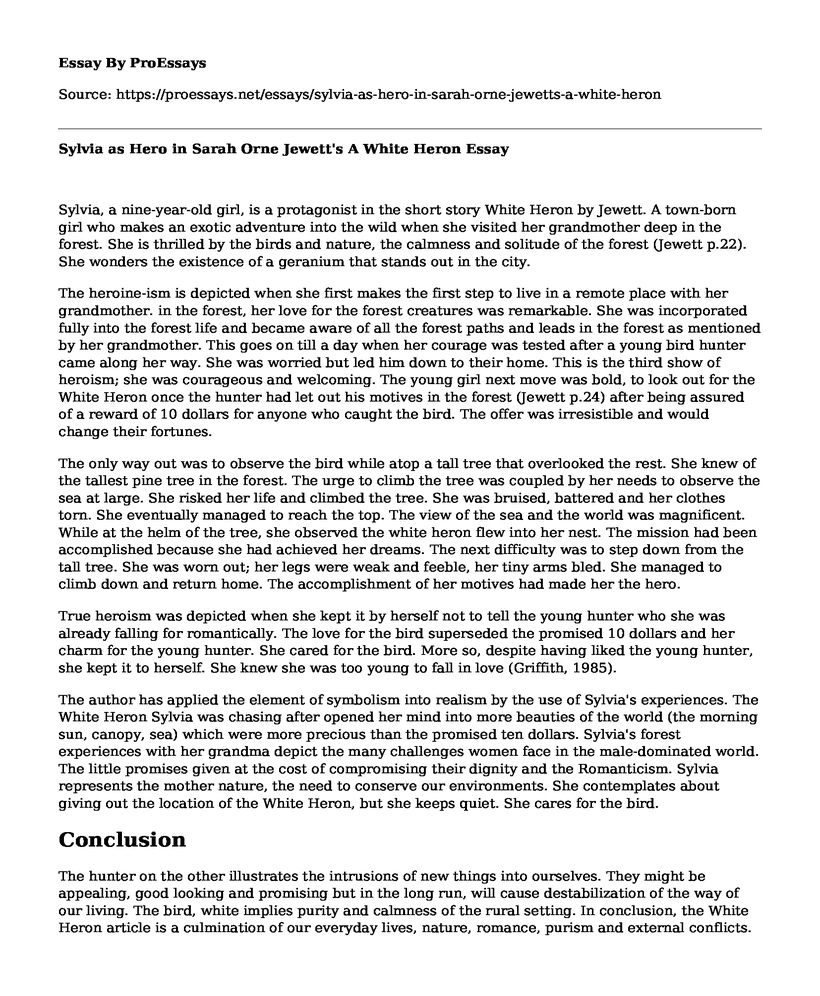Sylvia, a nine-year-old girl, is a protagonist in the short story White Heron by Jewett. A town-born girl who makes an exotic adventure into the wild when she visited her grandmother deep in the forest. She is thrilled by the birds and nature, the calmness and solitude of the forest (Jewett p.22). She wonders the existence of a geranium that stands out in the city.
The heroine-ism is depicted when she first makes the first step to live in a remote place with her grandmother. in the forest, her love for the forest creatures was remarkable. She was incorporated fully into the forest life and became aware of all the forest paths and leads in the forest as mentioned by her grandmother. This goes on till a day when her courage was tested after a young bird hunter came along her way. She was worried but led him down to their home. This is the third show of heroism; she was courageous and welcoming. The young girl next move was bold, to look out for the White Heron once the hunter had let out his motives in the forest (Jewett p.24) after being assured of a reward of 10 dollars for anyone who caught the bird. The offer was irresistible and would change their fortunes.
The only way out was to observe the bird while atop a tall tree that overlooked the rest. She knew of the tallest pine tree in the forest. The urge to climb the tree was coupled by her needs to observe the sea at large. She risked her life and climbed the tree. She was bruised, battered and her clothes torn. She eventually managed to reach the top. The view of the sea and the world was magnificent. While at the helm of the tree, she observed the white heron flew into her nest. The mission had been accomplished because she had achieved her dreams. The next difficulty was to step down from the tall tree. She was worn out; her legs were weak and feeble, her tiny arms bled. She managed to climb down and return home. The accomplishment of her motives had made her the hero.
True heroism was depicted when she kept it by herself not to tell the young hunter who she was already falling for romantically. The love for the bird superseded the promised 10 dollars and her charm for the young hunter. She cared for the bird. More so, despite having liked the young hunter, she kept it to herself. She knew she was too young to fall in love (Griffith, 1985).
The author has applied the element of symbolism into realism by the use of Sylvia's experiences. The White Heron Sylvia was chasing after opened her mind into more beauties of the world (the morning sun, canopy, sea) which were more precious than the promised ten dollars. Sylvia's forest experiences with her grandma depict the many challenges women face in the male-dominated world. The little promises given at the cost of compromising their dignity and the Romanticism. Sylvia represents the mother nature, the need to conserve our environments. She contemplates about giving out the location of the White Heron, but she keeps quiet. She cares for the bird.
Conclusion
The hunter on the other illustrates the intrusions of new things into ourselves. They might be appealing, good looking and promising but in the long run, will cause destabilization of the way of our living. The bird, white implies purity and calmness of the rural setting. In conclusion, the White Heron article is a culmination of our everyday lives, nature, romance, purism and external conflicts.
Works Cited
Griffith Jr, Kelley. "Sylvia as Hero in Sarah Orne Jewett's" A White Heron"." Colby Quarterly 21.1 (1985): 5.
Jewett, Sarah Orne. The Night Before Thanksgiving ; A White Heron And Selected Stories. Scholarly Press, 1979, pp. p.22-27.
Cite this page
Sylvia as Hero in Sarah Orne Jewett's A White Heron. (2022, Dec 05). Retrieved from https://proessays.net/essays/sylvia-as-hero-in-sarah-orne-jewetts-a-white-heron
If you are the original author of this essay and no longer wish to have it published on the ProEssays website, please click below to request its removal:
- Points of View on Courtly Love in Sir Gawain and the Green Knight - Essay Sample
- "Tuesdays With Morrie" Reaction Paper
- Literary Analysis Essay on "Let America be America again"
- Essay Example on Watchmen: Who Is the Hero According to Alan Moore?
- Essay Sample on Montresor's Revenge: A Well-Executed Plan Achieved 50 Years Later
- Essay Sample on Love's Overpowering Beauty: Ligeia by Edgar Allan Poe
- Paper Example on Two Literary Luminaries: Michael Ondaatje & Jhumpa Lahiri







